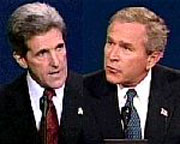 |
|
Bush and Kerry are in a fierce debate.
| |
What's the big question US presidential candidates should be asking
themselves?
Is my name short enough?
You only have to glance at the credits on a Hollywood movie to see the
polysyllabic, ethnic diversity
of surnames in the great melting
pot of the United States.
But when it comes to voting for a president, the gene pool shrinks rapidly, and the
preference is for monikers
that are blunt and Anglo-Saxon.
So if you want to find a way of forecasting who is going to win the
race for the presidency, look at the lengths and origins of their names.
The pattern since World War II has been for candidates with increasingly
short, poster-friendly names. And preferably sounding like they could be
the lead characters in a mini-series.
In the last electoral battle, in 2000, the names couldn't have got any
shorter, with a two-syllable play-off between George Bush and Al Gore.
Perhaps the Republicans have already rumbled this short-name advantage.
In the three decades since Richard Nixon was turfed out of office, Ronald
Reagan has been the only Republican candidate with a surname longer than
one syllable. Coincidence?
This hasn't always been successful. Bob Dole was overrun by the longer-named Bill
Clinton, but again it was by someone with an unassuming surname and there was
only a single syllable difference.
Bill Clinton also has the distinction of being one of only two
presidents since the WWII to have beaten rivals with fewer syllables in
their name. The other was Jimmy Carter, who beat Gerald Ford, in the far
from usual circumstances following Watergate.
Otherwise the candidate with a shorter name has not been defeated. All
of which must be a worrying sign for John Kerry - unless the "Dubya" is
counted as part of his rival's name.
Looking at the candidates' syllable count isn't an entirely frivolous
way of looking at elections, says Barbara Kellerman, research director at
the Center for Public Leadership, in the John F Kennedy School of
Government at Harvard University.
If politics is about brand logos and bumper stickers, then "short and
punchy" names which are highly visible and easy to remember are going to
be an advantage, she says.
When "masculine leadership" is to the
fore, a single syllable name is going to sound "strong,
sturdy and forceful", says Professor Kellerman. "Attention spans are
shrinking with each generation, and in an era of sound-bites having a
short name is going to make a difference. There's something
attention-grabbing about it."
(Agencies) |
美國總統候選人應該問自己的最重要的問題是什么呢?
那就是:我的名字足夠短嗎?
你只要瞥一眼好萊塢的電影明星,就不難發現在美國這個大熔爐里有許多來自不同種族的多音節姓氏。
但是,輪到選舉總統時,候選人的基因庫就迅速縮小,那些簡單明了的古英語中的名字最容易受到青睞。
所以,如果你想找出一種方法來預測誰將會贏得總統競選,看看他們名字的長短和來源吧。第二次世界大戰以來,候選人的名字越來越短,而且要在廣告上看起來親切。最好聽上去像電視短劇中主角的名字。
在上次選舉戰中,也就是2000年的總統大選中,總統候選人的名字已經短得不能再短了,喬治·布什和阿爾·戈爾之間展開了雙音節姓名的最后決賽。。
或許共和黨人已經發現了名字簡短的優勢。在理查德·尼克松被趕出白宮之后的30年間,羅納德·里根是唯一一個姓氏超過一個音節的共和黨候選人。這難道是巧合?
但是,名字簡短的候選人也并不總是能夠獲得成功。鮑勃·杜爾就被比他名字長的比爾·克林頓戰勝了,然而“克林頓”本身也是一個謙遜的姓氏,而且和“杜爾”相比也只差一個音節。
第二次世界大戰以來只有兩位總統戰勝了姓氏所含音節比自己少的競爭者,比爾·克林頓有幸成為其中的一位;另一位是吉米·卡特,水門事件后,在極其不同尋常的情況下,他打敗了杰拉爾德·福特成為美國總統。
除此之外,名字簡短的候選人沒有被打敗過。所有這些對約翰·克里來說一定是一個令人擔憂的跡象,除非布什名字中的W也被算作姓的一部分。
哈佛大學肯尼迪政治學院公共領導中心主任芭芭拉·凱勒曼說考慮競選人名字所含的音節數不完全是毫無意義的。
她說,如果政治宣傳和商標、汽車保險杠上的小標語有相同之處,那么“短而有力的”名字很顯眼,而且便于記憶,這將是一種優勢。
凱勒曼教授說:“男性領導”已成為既定事實,在這種情況下,單音節的名字聽起來會顯得“強大、堅定、有力”。他還說:“人們對總統選舉的關注程度一代不如一代,在這個生活節奏飛快的時代里,擁有一個簡短的名字是至關重要的。它能吸引公眾的注意力。”
(中國日報網站譯) |
